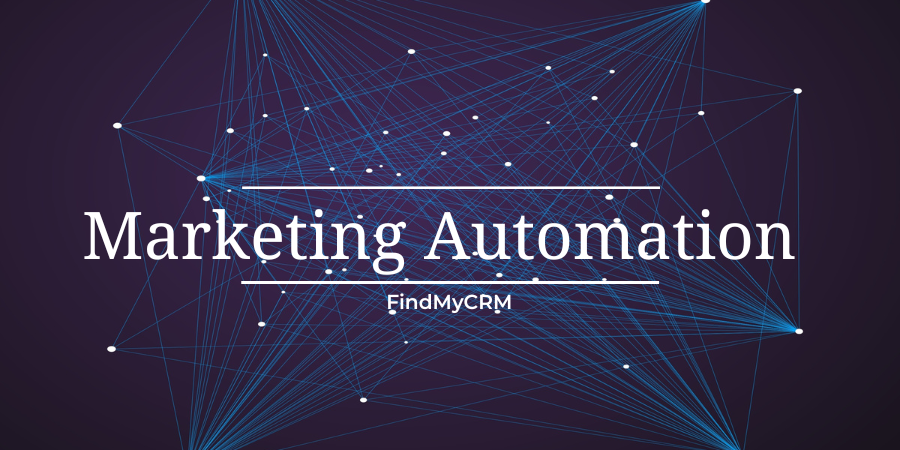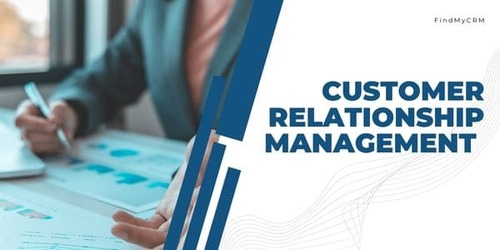What does "marketing automation" mean?
Marketing automation is a technology that automatically handles marketing operations and multifunctional campaigns across multiple channels. You can find it in such top CRM software as:
Businesses can target clients with automated messages via email, web, social media, and text with marketing automation. Workflows are sets of instructions that determine how automatically messages are sent. They can be created from scratch, customized using templates, or changed mid-campaign to improve performance.
To boost revenue and improve productivity, marketing and sales departments use marketing automation to automate online marketing campaigns and sales activities. Employees can focus on higher-order issues and human error is reduced when repetitive tasks are correctly handled by automation.
Marketing automation helps with lead generation, nurturing, and scoring and measures overall ROI on campaigns. Automation has a greater impact on cost and time savings as a company grows in size and complexity. Good marketing automation platforms are designed to grow with your company.
[Related Article: The Best Marketing Automation Software & Platform]
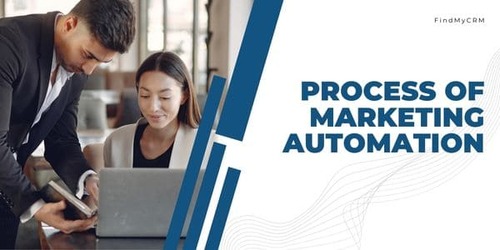
What is the process of marketing automation?
You get client information through different interactions, including emails, website visits, app usage, social media use, and more. A 360-degree view of each client can be created using this data.
However, automation depends on reliable data. When someone subscribes to your list, makes a purchase from your store, or clicks on one of your ads, they are giving you important information.
Browser cookies can also be used to monitor visitor behavior on your website and keep track of their purchases, actions, and locations.
The second phase of marketing automation is "marketing." You provide your system with the following information:
- Messages that you want to send and tags that you want to be added or removed from a contact
- Segments of your contacts that you want to focus on
- Conditions that will cause the automation to run
If everything goes according to plan, your system will then interact with your contacts at the exact moment that they are most likely to convert.
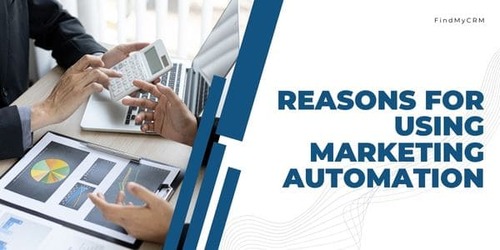
Reasons for using marketing automation in your businesses
When we consider the typical issues faced by businesses, we know that generating leads and maintaining client engagement are still top priorities. Businesses struggle to use the massive amounts of data generated in addition to these objectives. So, why use a marketing automation platform? Marketing automation software can help solve these problems by putting data to work by streamlining our workflows.
Most businesses see marketing automation as a tool for the middle of the funnel, useful for nurturing prospects with pre-written email sequences. Additionally, even if email marketing is a great application of marketing automation, this strategy can cause prospects and customers to have a disjointed experience as they move from marketing to sales to customer support.
Prospects are pushed through a fictional sales funnel that has useless touchpoints and irrelevant content. Businesses consistently follow the same playbook rather than adapt to the specific needs of each customer.
[Related Article: Marketing Automation vs CRM]
However, automated marketing methods should be used across the customer lifecycle. Smart marketing automation integration offers a fertile ground for strong, long-term relationships with your customers. When used effectively, marketing automation offers your company two key advantages:
Customized workflows
Each of your prospects' actions adds another piece of data to your marketing strategy by allowing you to understand exactly what your customers are looking for immediately. Despite how useful this data is, it is impossible to carefully track these activities. However, companies can use these inputs across a variety of channels to better understand their client's interests and offer the appropriate information at the right time using marketing automation services.
These workflows help direct interested potential customers to useful resources, producing warm leads that can then be nurtured thoughtfully into customers. Nevertheless, marketing automation doesn't end there. Businesses can continue to engage customers with personalized workflows that result in loyal, repeat customers who recommend friends and family. It`s more than possible when companies place the client at the flywheel's center.
Optimized processes
With streamlined processes that keep your clients at the center of everything, bring your whole business together. Create procedures that may be used by numerous functional teams to reduce the amount of work the client has to do during the entire marketing automation journey. Break down barriers and cooperate to offer a seamless customer experience beginning with the first touch and continuing long after the customer has made a purchase.
Because everything is automatically saved in your central data storage with effective marketing automation, there is no need for complex hand-off procedures, and internal workflows can help you prioritize tasks as they come up.
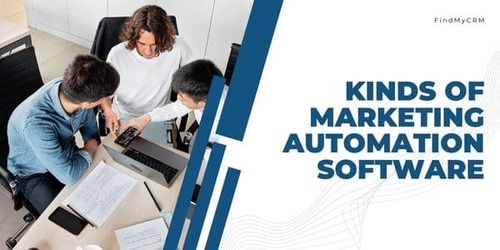
Several kinds of marketing automation software
Some definitions of marketing automation classify systems for competitive intelligence, pricing, distribution, and inventory management as "marketing automation tools." Following that, here is a list of different software kinds that belong to the category of marketing automation.
- Customer relationship management (CRM), which manages customer, order, and product data and automates sales operations.
- Sales force automation, which maintains data, provides analytics and deals with sales processes.
- Email marketing is a tool that makes email marketing easier. This includes setting up lead generation forms and creating a number of reports to monitor progress.
- Social media, which includes content posting, scheduling, monitoring, and analytics, automates many parts of social media marketing.
- Marketing automation workflows, which take human interaction out of marketing processes.
- Lead management is the automation of lead generation, lead scoring, and lead utilization in marketing or sales.
- Analytics, which visualize data and find patterns in market and customer information.
- Pricing is a tool that helps create competitive pricing structures, typically in an e-commerce environment. Examples include demand estimation and A/B testing.
- Digital advertising and promotion streamline and automate a lot of the ad design process and bidding strategies across digital media.
- Customer loyalty automates important aspects of promoting and managing loyalty programs.
There are lots of different kinds of accessible solutions. Some companies provide standalone products that must be combined with additional solutions. Some companies sell all-in-one solutions that include some or all of the tools mentioned above.
[Related Article: What You’re Missing Out if You’re Not Using CRM Yet]
Customer relationship management vs. Marketing Automation
What is marketing automation in CRM? CRM and marketing automation complement one another but do different tasks.
In order to convert qualified prospects into customers, marketing automation follows top-of-funnel actions. However, CRM maintains data on prospects and their stage in the sales process.
Since marketing automation and CRM work in tandem, it's essential to use a data orchestration solution or other tools to make sure that only clean information is moved between the two systems.
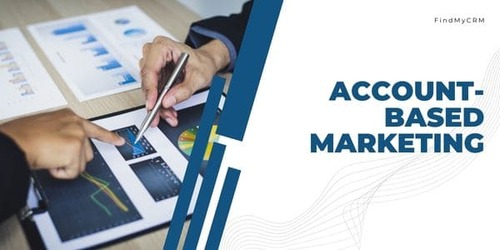
Account-Based Marketing vs. Marketing Automation
Combining account-based marketing (ABM) and marketing automation, according to several vendors and analysts, is the next step in streamlining the marketing process.
Many ABM software providers have improved their products with features like marketing automation. ABM can now include native databases, engagement programs, landing page and form functionality, and native email. Some additionally provide use cases for prospecting and demand generation.
Business-to-business (B2B) marketers can better cooperate with sales teams by identifying and targeting clients based on certain KPIs with the use of account-based marketing software. Unlike business-to-consumer (B2C) tactics, which focus on individuals, this strategy targets businesses.
ABM is based on the idea that in the B2B market, accounts drive sales. Marketers can identify, engage, convert, close, and measure progress against customers and prospects by focusing on account behavior, engagement, and activity.
Even with ABM technologies, managing the amounts of information processed by B2B marketers can be challenging. Because of this, marketing automation techniques are beginning to be included in ABMs, and vice versa.
Technology now supports contextual and personalized digital marketing automation instead of obsolete fill-the-funnel campaigns and drip marketing on steroids.
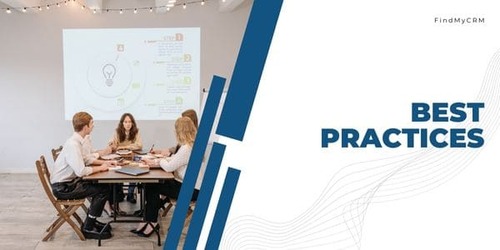
Best practices for marketing automation
Even though marketing automation requires minimum maintenance, you will still need to put some effort into it, especially during setup. Let's analyze some of the ideal ways for using marketing automation.
1. Be clear about the results you want
Gather all the information you have about your existing marketing strategies, then make a list of your automation-related goals. Then, you'll be able to monitor your progress. To get some inspiration, you can also gather some instances of effective marketing automation campaigns.
2. Consider how you want to segment your audience
The most effective marketing automation is targeted marketing. Your products or services as well as your customer base will determine who you should target. Take your time with segmentation because it is a crucial point of marketing automation. It is more important to do something correctly than quickly.
You can sell products that are suitable for different age groups. In that situation, you should segment by demography. Perhaps customers with various levels of responsibility in their companies are interested in your services. If so, divide the group according to professional level.
3. Make a flowchart
If-then concept is key to marketing automation. Decide when you want people to enter your workflow, such as when they subscribe to your list, and then choose when to move them.
You can visualize the if-then flow that your clients will follow with the customer journey builder. For instance, if someone responds to your welcome email, they will receive an offer relevant to their answer. If the offer is used, the client is added to a group that receives ongoing special discounts and offers, etc.
4. Check every aspect.
A/B testing helps you monitor the effectiveness of your marketing campaigns. Find out what resonates with your audience the most by trying different subject lines, photos, text, and send timings.
If some of your targeted messages aren't doing effectively, you can use that knowledge to improve your future campaign. On the other hand, you can analyze the features that your successful campaigns have in common and use those insights to improve your next marketing efforts.
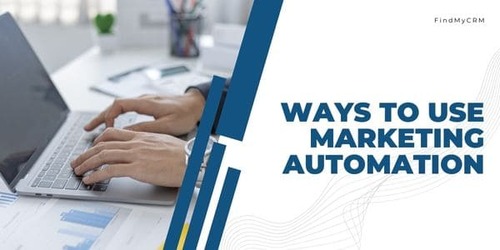
The best ways to use marketing automation
Combining software, strategy, and customer centricity maximizes the effectiveness of marketing automation. With the help of highly customized, useful content, you can nurture prospects and turn them into happy customers and loyal advocates.
Businesses should integrate automation into all aspects of their operations to minimize silos and bring teams together through time-saving processes in order to get the most out of marketing automation. When combined with human interaction, marketing automation can create a flywheel that keeps your company growing.
Instead of starting with your company's requirements, focus on the customer journey. Create processes that make the customer move from one touchpoint to the next by identifying prospective touchpoints that could benefit from automation in marketing.
- Use a CRM that integrates with your marketing automation system to manage contacts so that each action the customer does is recorded as a new data point.
- Connect clients to the next stage of their journey using these data points, whether it be through educational content, a salesperson, or a customer success check-in. Using this white-glove method with thousands of clients at once is the advantage of marketing automation.
An effective marketing automation strategy prioritizes tasks and streamlines handoffs to bring your teams together. When a lead is warm and ready to be reached by sales, automation assigns and informs the sales representative, who can then take full control of the contact record. Customer success receives a notification when a sale is made and is able to view all previous interactions and actions the customer had prior to make the purchase. The process not only works smoothly and effectively, but it also develops a long-lasting relationship between the client and the company.
[Related Article: Marketing Automation Tools: Top 7]
Start implementing your marketing automation strategy
It's time to start using automated marketing in your company when you know why marketing automation is important and are familiar with the term "marketing automation," its benefits, certain best practices, and the most popular platforms.
